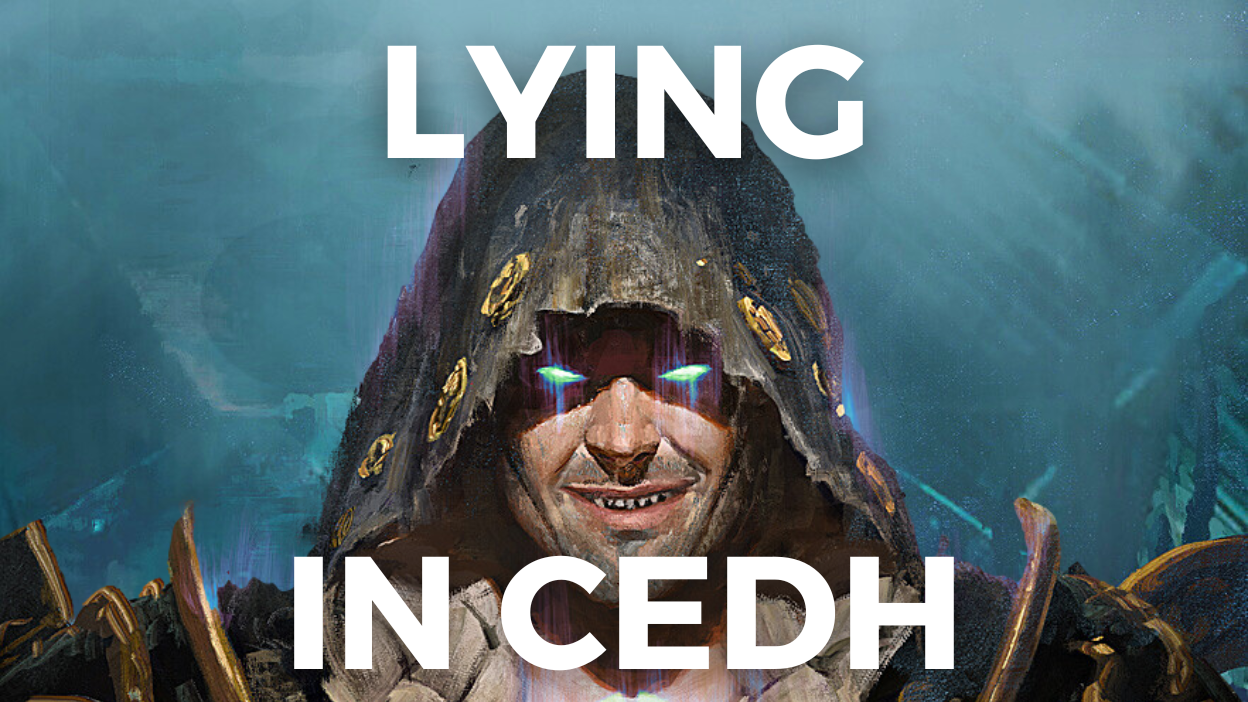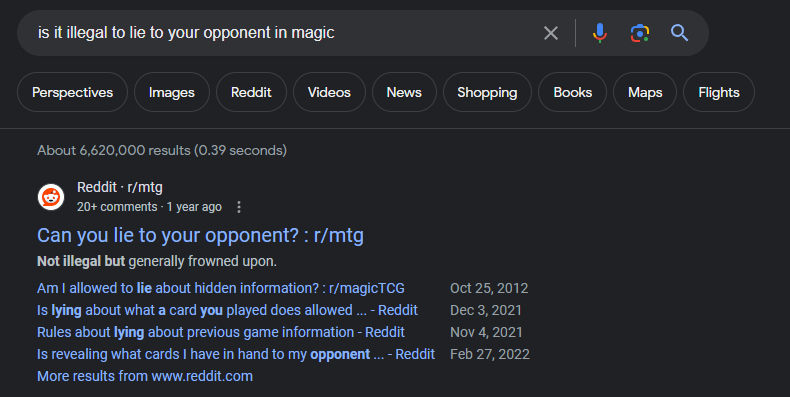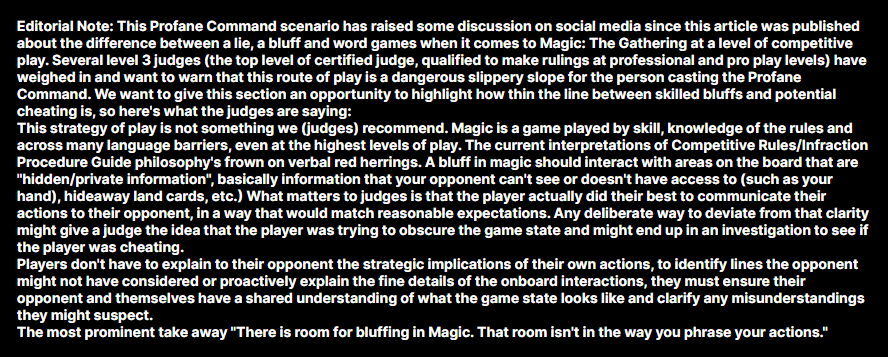Bluffing For Bucks: Lying in cEDH

Valki, God of Lies by Grzegorz Rutkowski
Despite being only two months into 2024, much has happened in the cEDH tournament landscape, with many tournament organizations hosting their first tournaments and setting the stage for the year of tournament cEDH, some of which even conclude in a dramatic, invite-only event of the most successful players over the course of the year. As a backdrop to this heightened stakes and competition comes discourse around deception. Specifically, lying in cEDH.
Deception can take a multitude of forms, each falling on a spectrum of how morally and socially acceptable they are to perform and integrate into your strategy to win. The most acceptable representations fall under the category of "bluffs" and are considered to be impressive spectacles of mastery at the game that are talked about in articles and online for years to come. The least acceptable are classified as outright cheating, which are punished severely in accordance with the specific cheat.
This spectrum of acceptance is vast, and the gray areas of acceptance for various actions are the subject of constant scandals. In cEDH, the presence of additional players means additional table talk and more opportunities to deceive. The latest issue taken to the court of public opinion is whether or not it's okay to flat out lie to your opponents when making deals or asserting what you are capable of within a cEDH tournament setting. To parse through the morality, and legality, of lying in cEDH, we need to start at what is considered acceptable deception in Magic.
Why Bluff In the First Place?
In a 2020 article about Magic, NPR called it a "fantastical fusion of poker and chess". This is a comparison I have seen before and often made myself because I find it to be quite apt. While there are plenty of strategic elements involving pieces of varying worth akin to chess, there is also a luck factor due to drawing from a deck of cards akin to poker. Another trait Magic shares with poker is bluffing.
Bluffing, or attempting to deceive someone as to one's abilities or intentions, is celebrated as difficult and high-level play within the context of tournament Magic, and there are countless articles breaking down not just how to bluff, but famous bluffs as well. My personal favorite among them is "How to Bluff in MTG: Mental Magic Deep Dive" by Reid Duke, which breaks down the fundamentals of bluffing as well as famous bluffs from some of the best players in the world like Patrick Chapin's Pen Trick and LSV's Settle the Wreckage.
All of this makes it quite clear that there are plenty of advantages to be gained by using deception to your advantage when playing Magic for stakes. Top players use it, and prospective up-and-comers actively look to improve at it as part of improving at the game, so what about actively lying? Instead of small tricks and suboptimal plays made to trick your opponent, why not outright lie to them?
Bluffing vs. Lying in Magic
While bluffing is considered to be impressive and masterful, outright lying to your opponent is much more controversial. In fact, if you search Google for "is it illegal to lie to your opponent in Magic" right now, you get the following result:

"Not illegal, but generally frowned upon." This is indeed the case, which naturally leads to all manner of players having various takes on how far is "too far" when it comes to being deceptive in Magic. What some players consider to be a bluff, others consider to be an outright lie. A notable example can be found in "Bluffing and the Mind Games of Magic" by Brian DeMars. DeMars outlines a game he heard about where a player cast Profane Command and stated: "I'll choose the two modes: deal X damage to you and I'll give all of my legal targets fear." The player then attacked with all creatures and their opponent, believing themselves dead to the attack due to the inability to block creatures with fear, conceded.
However, the Profane Command caster controlled a Chameleon Colossus, which, due to protection from black, could not be targeted by Profane Command and could have been blocked by their opponent. Using the verbiage, the winner of the game did not technically lie by speaking something untrue, but enough people considered it to be lying that the following editorial note was added to the article:

This sets forth a more formal line in the sand from a judging perspective: bluffing should use private or hidden information as a means to trick your opponent, not faulty or incomplete communication. Deceptive actions that are intentionally vague or communicate incompletely either verbally or via the board state are often called angle shooting, and are heavily frowned upon by the community despite not being against the rules as written. The fallout of angle shooting comes with a mixture of backlash and support, and it is not uncommon for high-level players to break down plays and give their own take on whether a play is an angle shoot or fair play.
Given the high stakes for which Magic: the Gathering is sometimes played, it is not uncommon for players to test the limits of the rules even to the detriment of their public perception, with some going as far as outright cheating and breaking the rules, in order to collect the spoils of victory. But what happens when you introduce a social element to the game and make it multiplayer? That opens up a whole new world of word play and trickery!
More Players Means More Liars
Despite being Magic's most popular format, Commander is not one that Wizards of the Coast supports with competitive tournaments. Made popular by the social experience, Commander is often played in "pods" of four players, leveraging Magic: The Gathering's flexibility as a game engine that works for more than two people. In doing so, it is common for "table talk" or "politics" to influence the outcome of a game.
Players open conversations stating who they believe to be the threat, what they claim they can do about it, and solicit assistance for other players they believe will lose alongside them if they don't work together. This opens up a whole new world of deception, as players will often lie about how much interaction they have in hand, who they believe the threat is, and what they plan to do with their turn. In order to build some amount of social commitment to working together, it is not uncommon for deals to be made.
Recently, there was an instance of a player casting a Grand Abolisher, a card most often cast to stop the table from using interaction to stop you from winning, and while it was on the stack the player casting Grand Abolisher stated they were unable to win even if it was resolved. This implies they can deal with it later on their own turn and save stack-based interaction, like counterspells, for later. No sooner had it resolved than the player went on to find a line to win the game, assuring the table they simply didn't see the line at the time Grand Abolisher was on the stack. This was in the cut to top 16 of a cEDH tournament, and one of the players who lost the game took to social media to air their grievances about lying in a match of cEDH.
This was met with public ridicule, citing the famous words judges say as part of their pre-tournament script: "your opponents do not have your best interest at heart", a statement made to encourage players to call a judge if they are confused about something instead of trusting their opponents. However, many cEDH tournament players raised their voices in support of the disgruntled player, stating that ruining your reputation as someone you can make deals with will hurt your long-term win rate, just to win a single game. This is consistent with social media pushback I got a few years ago, stating my surprise at how honest everyone is when making deals. A notable separation of public opinion emerged in this flurry of discourse: players accustomed to 1v1 Magic amused at the notion you would ever believe anything your opponent said, and players accustomed to four-player pods seeing the action as too far. So who is right? It remains to be seen!
cEDH Tournament Etiquette
As of today, I believe cEDH tournament etiquette still to be a work in progress. I believe players wishing to make deals should ask something in return. For instance, players may selectively show players their hand, if you make the statement "I can't win" then prove it! Show your hand to the player who would otherwise counter your spell! Players who can stop these wins should be demanding proof! Among top tables I have witnessed more and more of this when it comes to dire situations and everyone is teaming up, the three players most behind show their hands to each other in order to find the optimal way to take down the imminent threat. This removes any opening for bluffing how many interactive cards you have and builds trust where there otherwise would not be any.
This is a concept that has been done in 1v1 Magic too. I remember witnessing a Modern Tron mirror, which was infamous for being miserable, in which both players sideboarded out all four copies of Karn, Liberated, the best card in the matchup at the time, and had them face up in their sideboard pile to make the game more fun. If the players did not reveal the Karns to each other face-up, there is an opportunity to be tricked into cutting yours while your opponent kept theirs, and you would be easily defeated.
Deals made with only words are not binding in any way, and there is no real commitment from anyone without proof. While lying is frowned upon in the community today, I believe there is an easy fix if players just refuse deals without proof the deal is beneficial, and safeguarding yourself from being tricked into letting a Grand Abolisher resolve will be a primary fixture of a mature cEDH tournament etiquette.
Bluffing For Big Bucks in cEDH
Amidst the chaos of the latest cEDH lying discourse, I stated that, as of right now, the liar is "down internet points and up cold hard cash. I care about 6 months from now. A year from now" and that is still my stance. Many players don't even know or remember who the players that have been caught cheating and banned from various tournament circuits are, and I don't believe the player who lied will be remembered even 3 months from now as the community moves on to different issues.
In turn, tournament competitors seeing the short-term memory of the community will have to adapt to lying within cEDH deals becoming more prominent, as it does have near the cost that some would have you believe. I hope this leads to more prospective dealmakers demanding proof before agreeing, but honestly I would prefer table talk disappear entirely due to mistrust and players simply cast the spells they draw instead of spending so much time talking about them.
What do you think? Would you lie in a cEDH tournament? Do you lie playing cEDH with friends? Let me know in the comments, and thanks for reading!